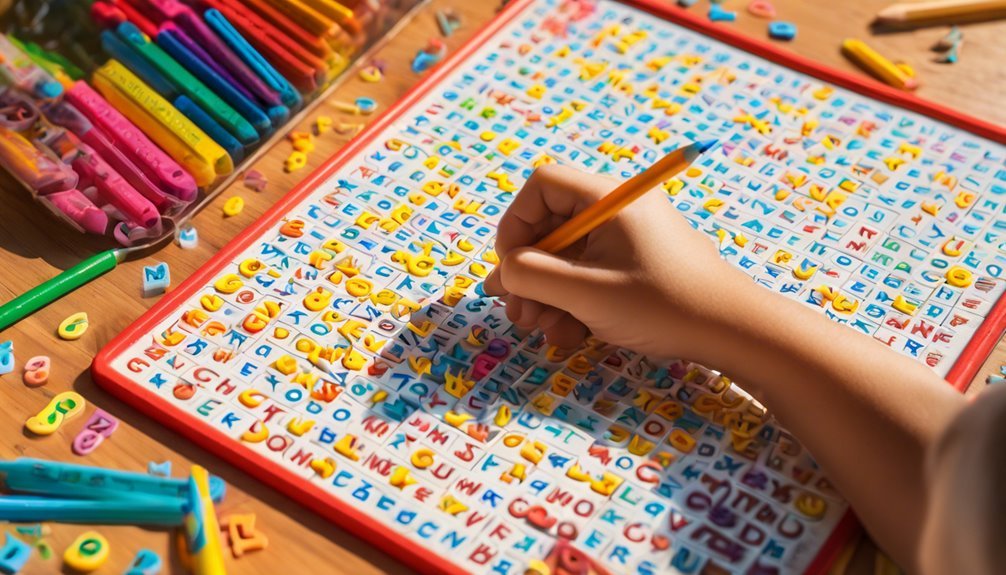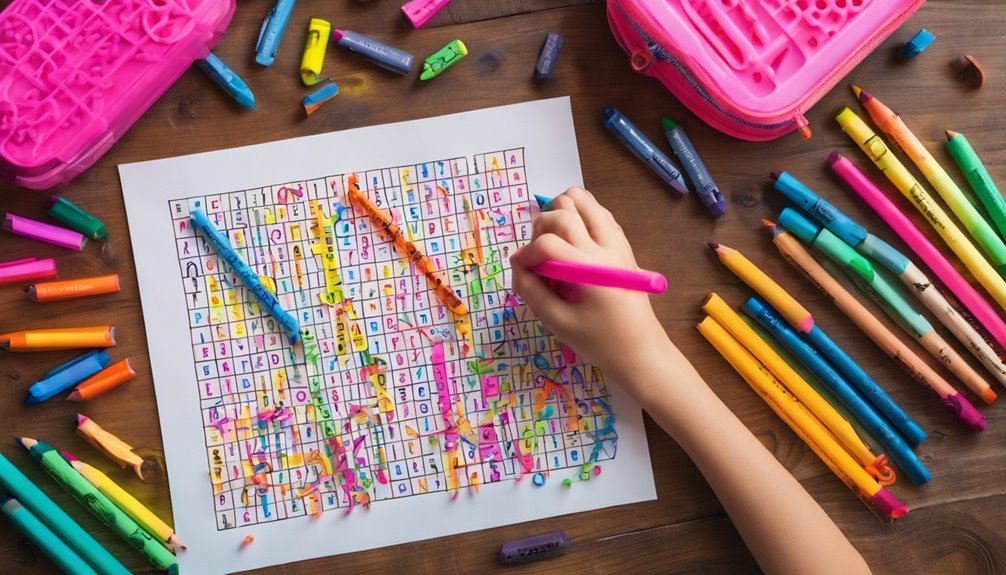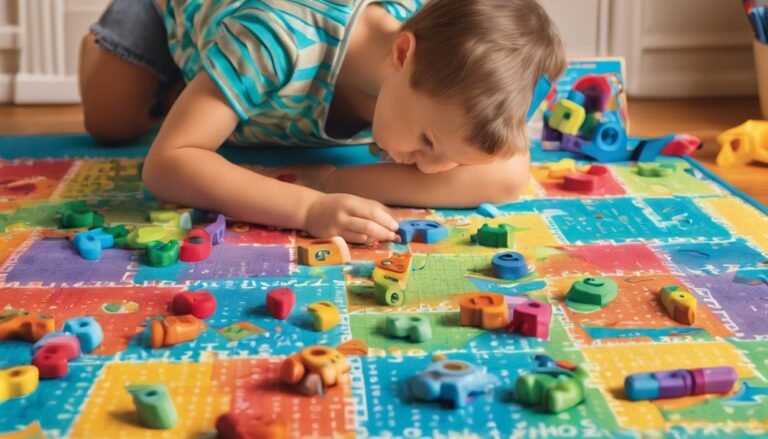How Word Search Puzzles Improve Spelling and Reading Skills
You might not realize that engaging with word search puzzles can significantly enhance your literacy skills. As you hunt for hidden words, you're not just having fun; you're also honing cognitive abilities that improve spelling and comprehension. This seemingly simple activity challenges your brain in ways that extend beyond mere entertainment. Understanding the underlying mechanics of how this process works can shed light on its broader educational benefits.
Key Takeaways
- Word search puzzles enhance spelling by encouraging focused engagement with letter arrangements and word structures.
- They boost reading skills through improved pattern recognition, crucial for decoding words during reading.
- Completing puzzles strengthens memory retention, aiding in easier recall of spelling in writing tasks.
- The varying difficulty levels of puzzles challenge users, sharpening their overall reading capabilities.
- Engaging with word searches promotes phonetic awareness and helps identify common letter combinations, improving spelling techniques.
The Cognitive Benefits of Word Search Puzzles
While you might think of word search puzzles as just a fun pastime, they actually offer significant cognitive benefits that enhance both spelling and reading skills. Engaging in these puzzles requires focused cognitive engagement, as you scan for words amidst a jumble of letters.
This active participation boosts your ability to recognize patterns and enhances your spelling capabilities. Moreover, the repetitive nature of finding words strengthens memory retention, making it easier for you to recall spellings in everyday writing.
As you consistently challenge yourself with varying levels of difficulty, you sharpen your reading skills, too. So, the next time you dive into a word search, remember that it's not just a game; it's a workout for your brain.
Enhancing Vocabulary Through Play
Playing word search puzzles can significantly enhance your vocabulary, making it an engaging and effective learning tool. As you search for words, you encounter new terms, sparking curiosity and prompting exploration.
This playful learning approach encourages vocabulary expansion by immersing you in a context that feels enjoyable rather than tedious. Each completed puzzle reinforces your memory of these words, allowing you to recall them more easily in conversation or writing.
Additionally, the repetitive nature of word searches strengthens your understanding of word structure and usage. By consistently engaging with diverse vocabulary in a fun format, you'll not only expand your lexicon but also develop a deeper appreciation for language, making your learning experience both effective and enjoyable.
Improving Visual Recognition Skills

Word search puzzles serve as an excellent tool for improving visual recognition skills. When you engage with these puzzles, you enhance your visual processing abilities by training your brain to quickly identify patterns and letters.
This activity requires you to scan the grid, focusing on both individual letters and the overarching words. As you search, you're not just looking for letters; you're developing pattern recognition, which is crucial for reading fluency.
Each completed puzzle strengthens your ability to discern subtle differences in letter arrangements, effectively sharpening your focus and attention to detail. Over time, this practice can lead to improved reading comprehension, as your brain becomes more adept at recognizing familiar sequences and structures in text.
Developing Spelling Techniques
As you immerse yourself in word search puzzles, you'll naturally start developing effective spelling techniques. These puzzles enhance your phonetic awareness, enabling you to connect sounds with letters, a crucial part of mastering spelling strategies. By regularly engaging with these puzzles, you'll identify letter patterns and frequently used combinations, making spelling more intuitive.
Here's a quick overview of common spelling strategies:
| Spelling Strategy | Description |
|---|---|
| Visual Memory | Remembering the shape of words. |
| Phonetic Breakdown | Analyzing sounds in words. |
| Chunking | Grouping letters into manageable parts. |
| Repetition | Practicing words multiple times. |
| Mnemonics | Using memory aids to recall spelling. |
Incorporating these strategies into your puzzle practice will solidify your spelling skills.
Understanding Word Structures and Patterns

Understanding the structures and patterns of words is essential for improving your reading and spelling abilities. When you engage with word search puzzles, you start recognizing various word patterns and letter combinations, which can significantly enhance your skills.
Consider these key aspects:
- Prefixes and suffixes help you identify the meaning of new words.
- Common letter combinations such as "th," "ch," and "sh" can reveal how words are constructed.
- Word family connections allow you to understand relationships between words, enriching your vocabulary.
Making Learning Fun and Engaging
Engaging with word search puzzles transforms learning into an enjoyable experience that captivates both children and adults. These interactive activities not only stimulate minds but also foster a sense of achievement.
As you hunt for words, you're not just having fun; you're enhancing your spelling and reading skills in a playful learning environment. This approach encourages curiosity and exploration, making the educational process feel less like a chore and more like an adventure.
Frequently Asked Questions
Are Word Search Puzzles Suitable for All Age Groups?
Yes, word search puzzles are suitable for all age groups. They offer educational benefits, enhancing cognitive development by improving pattern recognition and vocabulary skills. You'll find enjoyment and learning, regardless of your age or skill level.
How Long Should a Word Search Session Last?
For optimal timing, keep your word search session duration between 15 to 30 minutes. This timeframe helps maintain focus and enjoyment, preventing fatigue while maximizing engagement with the activity. Short, regular sessions yield the best results.
Can Digital Word Searches Be as Effective as Paper Ones?
Imagine diving into a sea of letters; digital word searches can indeed be as effective as paper ones. They foster digital engagement, offering cognitive benefits that enhance your skills, making learning enjoyable and accessible anywhere.
What Types of Words Are Best for Beginners?
For beginners, focus on common beginner words like "cat" and "dog," as well as visual recognition words such as "sun" and "tree." These terms enhance familiarity and make the puzzles enjoyable and rewarding for you.
How Can Parents Create Custom Word Search Puzzles?
Imagine your kids exploring a treasure map! You can create custom word search puzzles by selecting themes they love and adjusting puzzle difficulty. Incorporate relevant words, and watch their excitement grow with each challenge!
Conclusion
In conclusion, engaging with word search puzzles isn't just a pastime; it's a powerful tool for enhancing your spelling and reading skills. As you hunt for hidden words, you're not only boosting your vocabulary but also sharpening your visual recognition and understanding of word structures. This enjoyable challenge turns learning into a game, proving that when fun meets education, you're more likely to remember and apply what you've learned. So, why not dive into a puzzle today?







